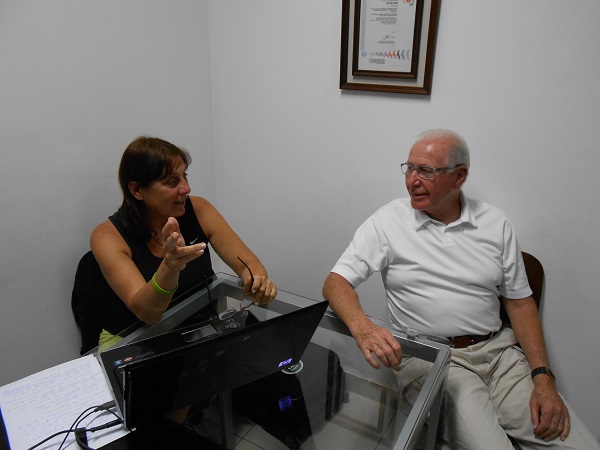
We spoke with René Granat regarding Venezuelan hockey. René led hockey development in Venezuela for more than 20 years, 18 in the Continental Hockey as PAHF Board Member. René still plays goalie every chance he gets to play with the veterans.
His love of hockey brought him to Chiclayo, Peru, XVII Bolivarian Games. Retired now from the being president of Venezuela Hockey and a member of the PAHF Board, he is an ardent follower of hockey from the stands.
How do you see the Venezuelan hockey from this new place?
I came as a special guest of the Peruvian Olympic Committee. I think it looks good. I trusted Zuleika, the new president of the Venezuelan Hockey Federation that hockey will continue to grow. I know it is her main interest.
Was there a transition period accompanying the new leadership?
We are still in the transition period. One of the things that motivated me to help Zuleika is the respect that she shows. I help with inquiries and give advice from my many years of experience.
What are the main challenges that the new Venezuelan Directive will have?
We have two main challenges. We are in danger of being without a hockey pitch later this year, on the eve of the ODESUR Games, for maintenance reasons. Even though the Ministry of Sport says five artificial pitches are to be purchased, we still are are not sure if this is for hockey. We are in search of our own pitches. Three or four pitches in different states would be ideal to start.
The other immediate challenge is finding new coaches to replace the current coaches. We need coaches trained in high performance and competition to be able to make a big step. I think the Argentine coaches are a good option for their level and they adapt easily to the Venezuelan idiosyncrasies. Our last coach Paul Maloberti (ARG) to name just one, was a very positive experience for the Venezuelan hockey.
René, your teams are having an excellent performance in this tournament. How did you achieve this growth in Venezuelan hockey?
There were two basic reasons for these achievements. The first was to introduce hockey in the UNEFA (Experimental University of the Armed Forces). This penetration of hockey at the University level, starting with the coaching course organized by the PAHF and taught by William Santilli in 2006 was a determining factor. The University has campuses in different parts of the country. The team already has players that formed in the UNEFA.
Another important factor was the order of the Ministry of Sport to the Regional Institutes, at the time, to support the Olympic sports. Thanks to that they opened many doors for us.
What do you forsee for the Venezuelan teams over these next two years?
The teams will be very good, if we continue the plan to concentrate hockey in Caracas and if students remain dedicated to study, train and participate in ODESUR Games and the World League. It will be promising if it continues to receive support from the Ministry of Sport as we do now.
If we could count on a sand pitch in the cities of Barinas and Barquisimeto we would be fighting to take the top in the second group of the continent. We aspire to at least fight for the Silver Medal in the ODESUR Games in March of 2014.
Thanks René for talking with us. We did not say goodbye because we know that we will always find you in any hockey stands cheering for sport you love so much.
Visit the official PAHF site at www.panamhockey.org for all information, updates and pictures of Tournament of Hockey XVII Bolivarian Games that are held in Chiclayo, Peru, from 23 to 30 November 2013
